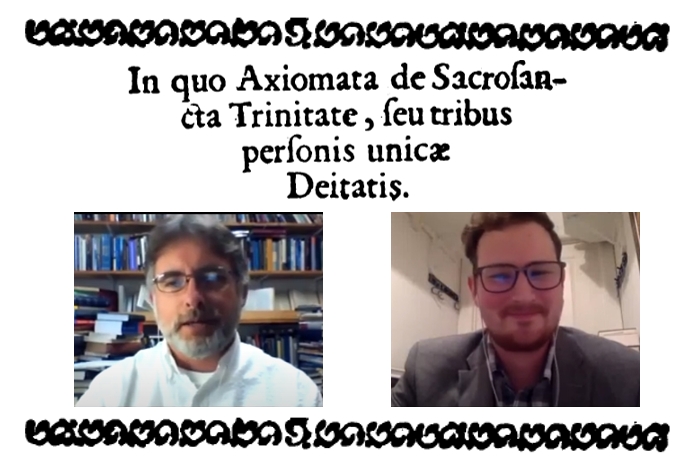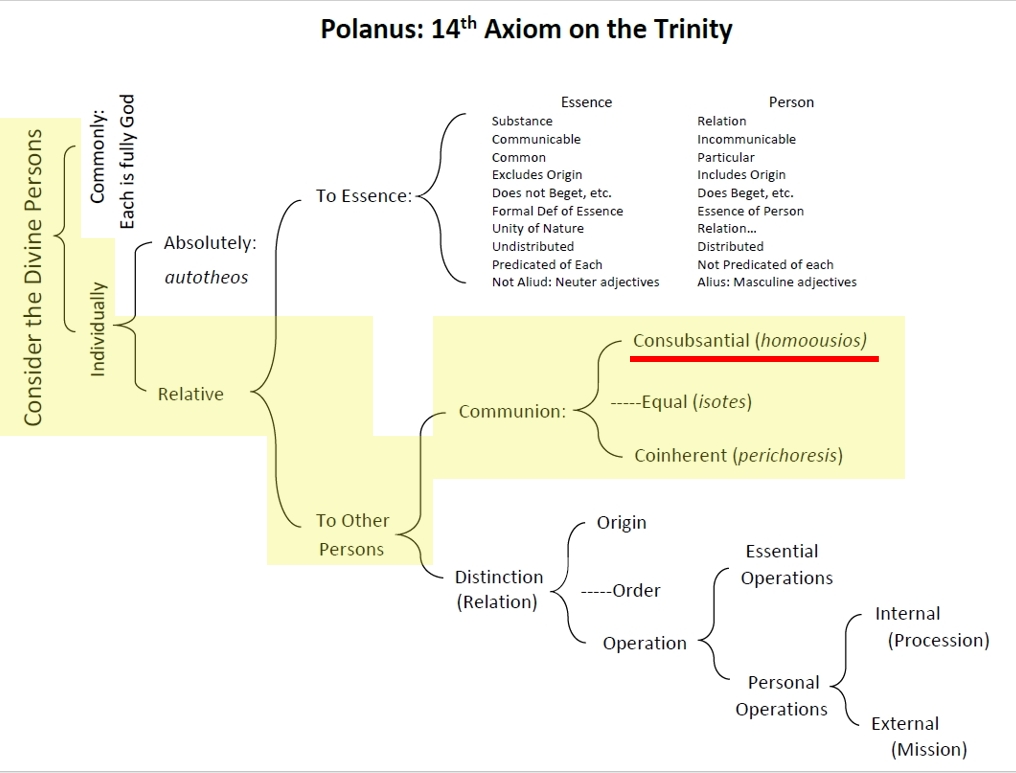
In the journey through his long 14th Axiom, Polanus has one last thing to say about how we should speak of a person of the Trinity in relation to the divine essence. What he wants to say is that we should avoid weird sentences like “God begets God,” or “God begets the Son,” because it mingles abstract and concrete ways of speaking. It’s better, of course, to say that the Father begets the Son. But Polanus also points out that if somebody does say this kind of thing, the reader can still tell that in such a sentence, “God” means the Father, because that idea is implied by the use of the term “Son” or even “beget.” This little section is, I confess, rather recondite and recherché, which is fancy-pants talk for “I don’t know why he felt like he had to go into all that.” But rehearsing these distinctions is still good intellectual discipline in its own right, and it may also help us read the occasional hymn or sermon charitably: while agreeing that people shouldn’t talk confusingly, we can also acknowledge that it’s possible to put a true construction on a bad phrase.
The next topic, however, is where we finally get to the subject matter that most of us are probably expecting in a tract of trinitarian theology: the relation of the persons to each other. And the first thing he’ll say about a person in relation to the other persons is that they are homoousios.
For those of you following along on the Ramist chart, here’s where we are:

That is, we are considering the divine persons individually, relative to the other persons, in their consubstantiality.
Here is Ryan Hurd’s translation of this section:
Nevertheless, one can say something of God in the concrete which cannot be said of the deity or divine essence in the abstract—e.g., we say “God is generated of God,” but not “Deity is generated of deity.” Albeit, if the word “essence” is not said abstractly, but said figuratively for the divine person or said personally, then it is said by some individuals that the divine essence i.e. the Father generated the divine essence i.e. the Son, as Lambertus Daneus[1] points out. So one speaks figuratively that the Father generated the divine essence, and the divine essence generated the Son. This word “Son” restricts the common word “essence” to the person of the Father: for subjects are such as they are permitted by the predicate. But despite this, figured [=figurative?] ways of speaking like this are rejected, as urged above. Now from these reminders, it is clear that the person is not so absolutely speaking the divine essence, with the result that utterly nothing lies [conceptually] between the divine essence and person. And for this reason we loathe the Sabellians and Samosatenians who conflate person with essence.
One may consider the person comparatively to the other persons both with respect to communion and with respect to distinction. The communion of divine persons is ομοουσια, ισοτης, or περιχωρησις εναλληλος.
The oμοουσια, the consubstantiality or coessentiality, of divine persons is that whereby the three persons are of one same substance or essence singular and one in number; or, that whereby they are one according to essence, because the essence that belongs to them all is one and never is one essence of the Father, one essence of the Son, and one essence of the Holy Spirit. The following testimonies demonstrate this ομοουσια: “There are three who witness in heaven, Father, the Word, and the Holy Spirit; and these three are one” (1 John 5:7); “I and the Father, we are one” (John 10:30). “One” [unus] is not said because they are one person, but “one” [unum], because their essence and nature is one. The following shows what Christ means in John 10:30 about the community of essence: first, the intent of Christ’s words, because Christ declares the cause of the common power in the elect to be saved; second, the way the Jews themselves took it as well as how Christ did by his silence which signals he approved their thought; and finally, Christ’s own actual explanation in 10:38, when he says that the Father is in himself and he is in the Father. In light of this, the nature of the generated is the same as the nature of the generating, even though he who is generated possesses his existence otherwise, as Basil the Great says.[2]
The community of essence is not like the community of a cause to effects, of a subject to its accidents, of a whole to its parts, of a universal to particulars or individuals, of genus to species, or as one thing to many things. Rather, the community of essence is as a single thing to its modes which are in the thing.
Thanks to this ομοουσια, the Son is just as αυτοθεος as the Father (i.e. having the divine essence which exists in itself, or God existing through the essence which exists in itself and not in another essence); and the Holy Spirit is just as αυτοθεος as the Father and Son.
___________________________________
[1] Lambert Daneau, Commentary on Lombard’s Sentences, Book I.
[2] Basil the Great, Against Eunomius Book 4, Ch. 1, sect. 32.
And here is our discussion:
Program notes:
Polanus cites Lambertus Daneus’ Commentary on Lombard’s Sentences, Book I. This is Lambert Daneau (1530-1590), a French pastor and theologian who studied in Geneva and taught in Leiden. His Lombard commentary is large (750pp) and detailed. Here’s Daneau’s page at Post-Reformation Digital Library; and here’s a link to the page in the Lombard commentary that Polanus is citing.
Polanus also makes the point that “the nature of the generated is the same as the nature of the generating, even though he who is generated possesses his existence otherwise,” and attributes it to Basil the Great’s Against Eunomius, Book IV. I haven’t been able to find the relevant section, even though Polanus politely tells us it’s “Book 4, chapter 1, section 32.” One problem is that Basil’s Against Eunomius only has three books, so perhaps it’s been re-numbered since whatever edition Polanus consulted ca. 1600. Book 2 certainly has a lot of argumentation about the Begotten. Or perhaps Polanus means Gregory of Nyssa’s Against Eunomius, the fourth book of which is certainly about generation. Somebody should look this up, I suppose.